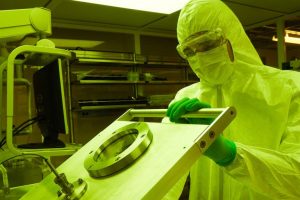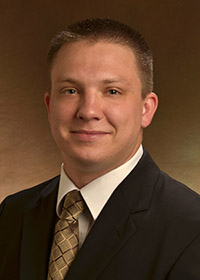Professor Developing Device to Administer Cancer Drug

Engineering master’s student William Gerding works in the clean room at the UT–Oak Ridge National Laboratory Joint Institute for Advanced Materials under the guidance of Eric Lukosi.
A new device under development by a nuclear engineering professor will allow doctors to dispense accurate dosages of a drug made with actinium-225, an isotope that has been shown to be effective in treating—and curing—myeloid leukemia.

The device, devised by Assistant Professor Eric Lukosi and fabricated by master’s student William Gerding, is currently in production. Once it is built, it will go through testing at Oak Ridge National Laboratory.
“We’re slowly moving toward the demonstration of the device. It’s been fabricated; now we just need to package it and make sure it works,” Lukosi said. “This could help save lives.”
Lukosi’s device would act as a critical quality assurance measure, guaranteeing that patients receive treatments exactly as recommended by their physicians.
Myeloid leukemia can spread quickly and affect lymph nodes, organs, and the central nervous system. Acute myeloid leukemia is found most often in adults over the age of 45 and is frequently fatal for patients 60 and older.
Actinium-225 is an isotope extracted from thorium-229, a waste byproduct of the fuel that was used for ORNL’s molten salt reactor experiment in the 1960s. In 1994, ORNL began purifying thorium-229 in order to extract actinium-225.
Since then, ORNL has sent approximately 900 shipments of actinium-225 to hospitals, clinics, and research institutions. The isotope has been studied as a treatment for cancer for a number of years and recently gained attention as a possible cure for myeloid leukemia.
As with many medical treatments, particularly radiation therapies, quality control issues that could jeopardize patient health are a concern. Support technologies play an important role in ensuring patient safety. For example, modern insulin pumps assist in diabetes treatment by monitoring blood sugar levels so appropriate levels of insulin can be delivered to a patient throughout the day.
Actinium-based therapies could specifically benefit from support technology because current control methods can be time-consuming and costly.
“Right now, the method of finding out what is inside the sample requires an external detector,” Lukosi said. “There are a lot of factors that need to be taken into account to get an accurate measurement of the activity inside the sample.”
Initially, Lukosi conceived of the device to use in spent nuclear fuel reprocessing.
“There are a whole host of applications for this technology, including environmental sampling,” he said.
Contact
- Megan Boehnke (mboehnke@utk.edu, 865-974-3242)
- Jennifer Brown (jbrow209@utk.edu, 865-974-6765)